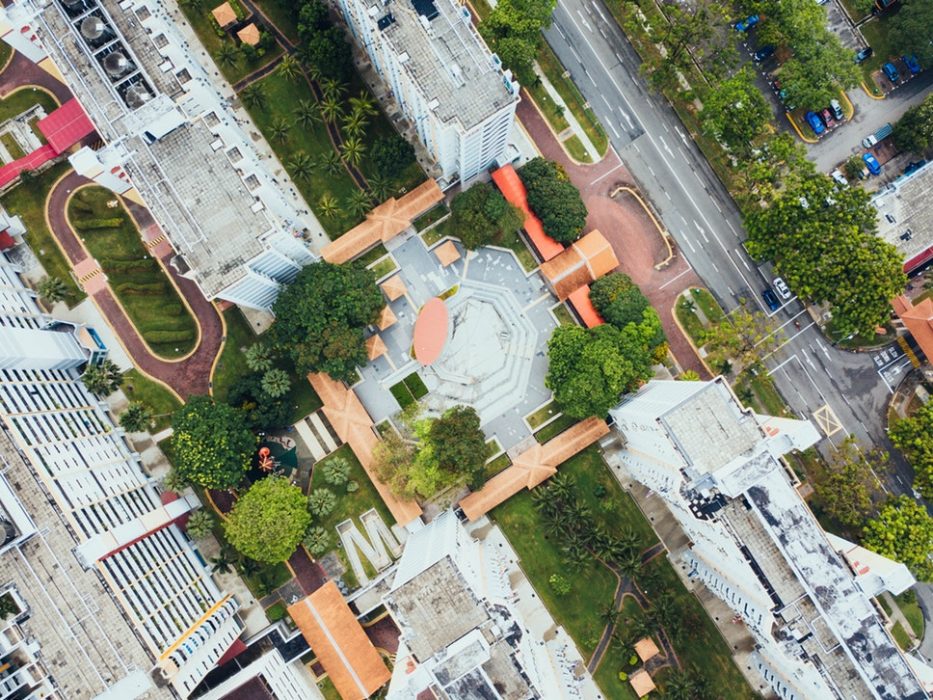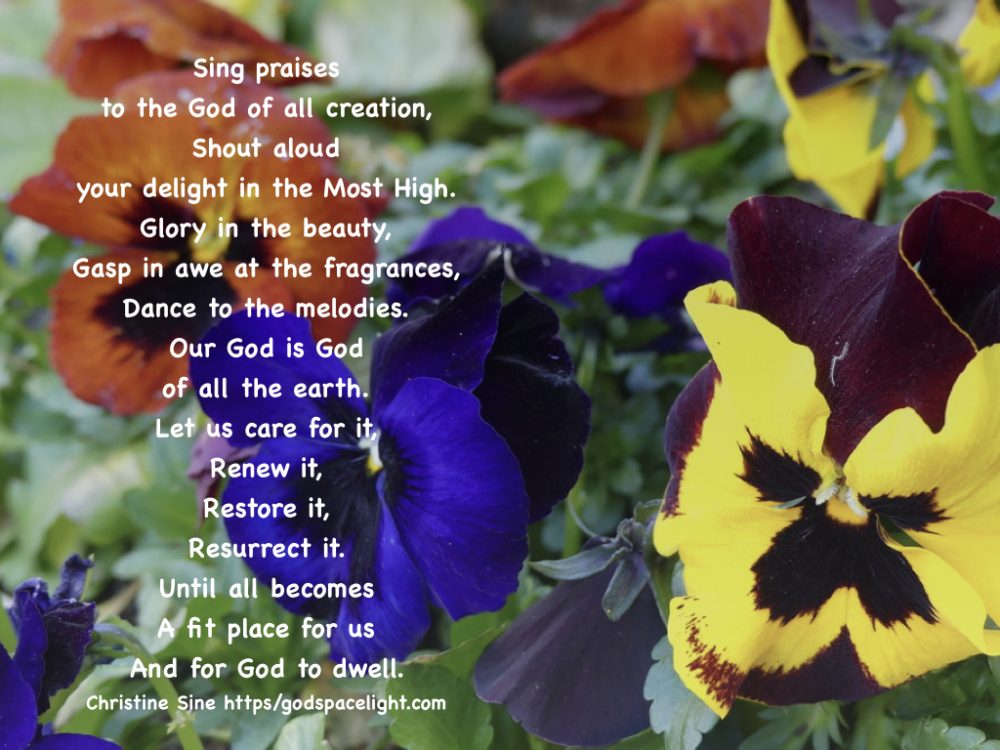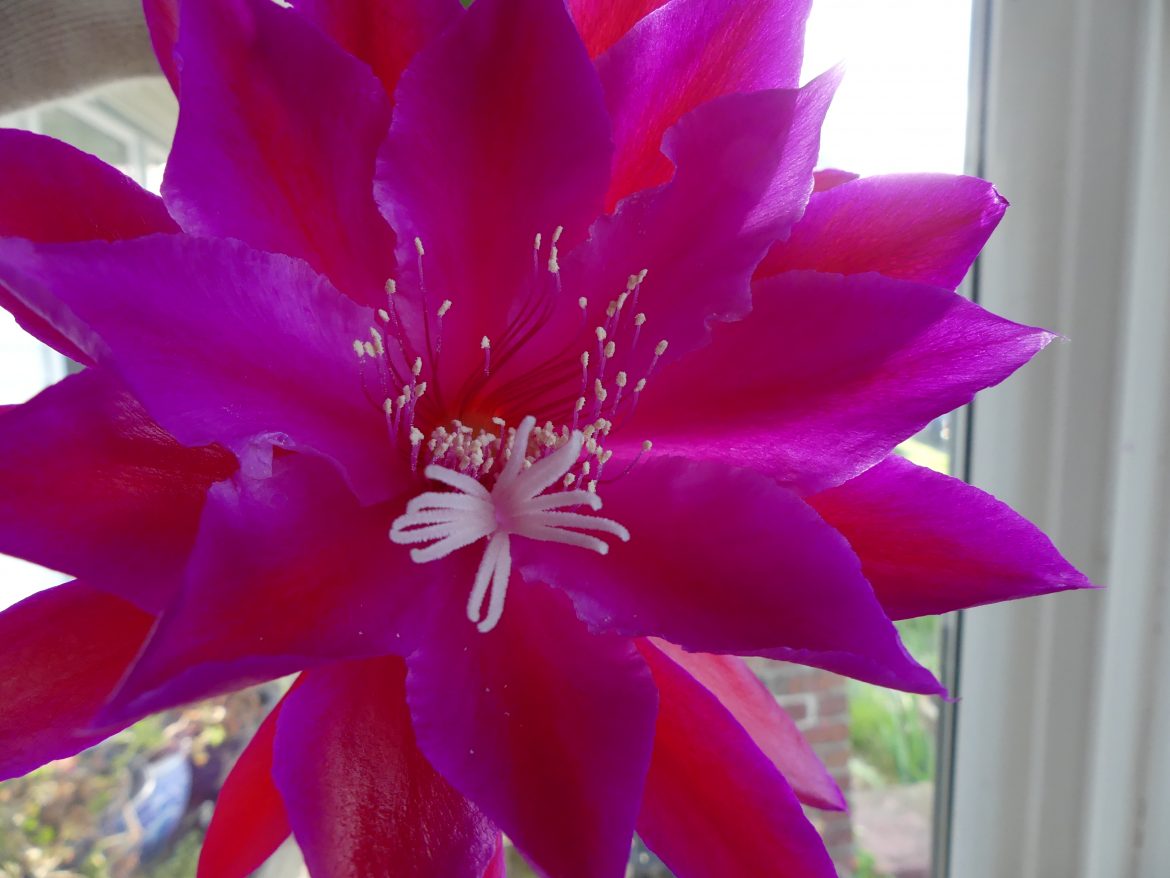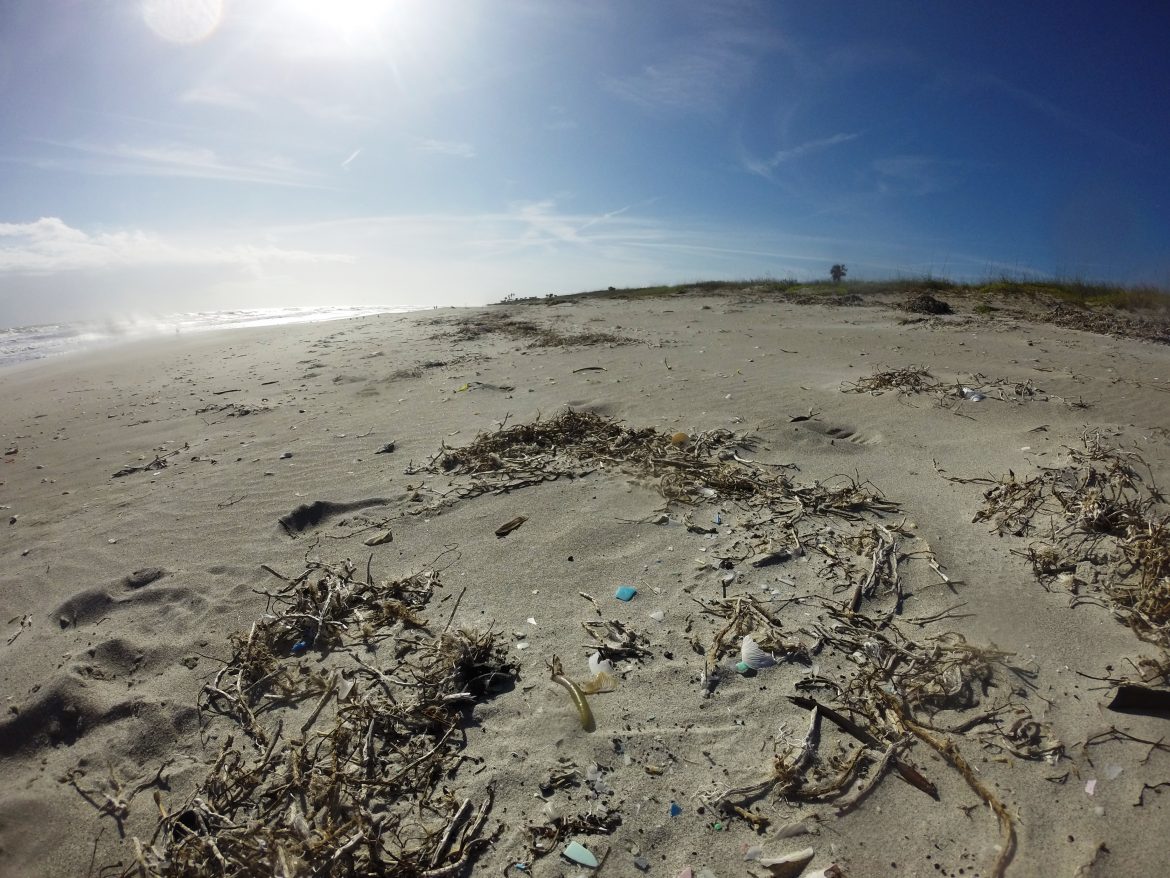By John Birch —

Have you ever wondered what it would look like to welcome God home to an earth restored, transformed and made new? Have you ever thought about what it would take to transform our earth into a home that is fitting not just for humanity but for God?
Yes I know that God is present in all places and at all times, but that doesn’t necessarily mean that God finds all places and all times a comfortable place to reside.
This has been the focus of my contemplation over this earth day weekend. I have blogged about this before but stirred by Earth Day, I find it always returns to my attention at this time of the year.
Saturday was a glorious day here in Seattle with the sun shining brightly and warmly, burning away the lethargy and dullness that the last month of rain and cold has nurtured in me. As the sun warmed me, my thoughts kept returning to images of God’s new world. Beauty, peace, justice and compassion would surround us. Laughter, dancing, singing, playfulness and joy would be everywhere. Generosity, love, and unity amongst all people. Creation would be renewed and wholeness would flourish.
Is it possible? The imagery of the end of time we see in Revelation is of heaven coming down to earth, of earth restore and made new. Maybe total transformation is not possible in this present age but at least we can work for glimpses of it in anticipation of the day when Christ returns and all is indeed made new.
Revelation 21:1-5 The Voice (VOICE)
I looked again and could hardly believe my eyes. Everything above me was new. Everything below me was new. Everything around me was new because the heaven and earth that had been passed away, and the sea was gone, completely. 2 And I saw the holy city, the new Jerusalem, descending out of heaven from God, prepared like a bride on her wedding day, adorned for her husband and for His eyes only. 3 And I heard a great voice, coming from the throne.
A Voice: See, the home of God is with His people.
He will live among them;
They will be His people,
And God Himself will be with them.
4 The prophecies are fulfilled:
He will wipe away every tear from their eyes.
Death will be no more;
Mourning no more, crying no more, pain no more,
For the first things have gone away.5 And the One who sat on the throne announced to His creation,
The One: See, I am making all things new. (turning to me) Write what you hear and see, for these words are faithful and true.
What is Your Response?
As we celebrate EARTH WEEK, this week, spend time contemplating your images of what our earth could look like if it was once more a fitting home for God. God’s presence is already with us always, but to make this earth a home for God we need to put all our efforts in to transforming – not just our physical environment, but our relationships and our inner selves.
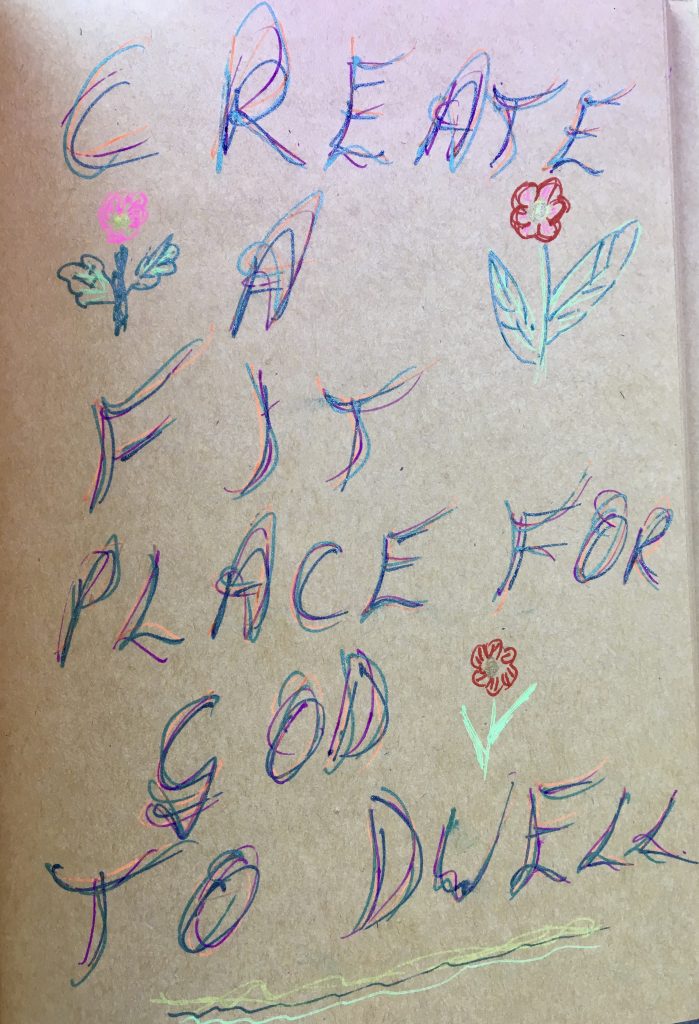 Take out your journal and write CREATE A FIT PLACE FOR GOD TO DWELL in large letters.
Take out your journal and write CREATE A FIT PLACE FOR GOD TO DWELL in large letters.
Prayerfully contemplate your statement.
Decorate the letters, in whatever ways your creativity inspires you.
Make a list of “the perfect home for God“. Maybe you want to watch a couple of those popular home renovation programs to inspire you first.
How is God prompting you to respond? What could you do to make this world a more inviting place for God to dwell?
by Christine Sine
April 22nd is such an important day to celebrate the goodness of God in creation.
A couple of weeks ago I had the opportunity to record this podcast with Beth Bond at the Evangelical Environmental Network for their Mom’s group. I hope you enjoy listening to it.
I have also been doing some more research on plastic and how to decrease its use in my life. As a result I have decided to do away with plastic milk bottles and go with glass. There is only one farm in the Pacific NW that does this – Twin Brooks Creamery . With the deposit on the bottles my milk will be no more expensive than in plastic and I love their mission statement. We are a family owned & operated dairy that exists to glorify God through the stewardship of the soil and animals He has entrusted to our care, in the best possible way.
I also came across this great video – recycling plastic as asphalt sounds like a wonderful way to get rid of so much of what now goes in the landfill.
The photo above may not have anything to do with my post but as we celebrate the goodness of God in creation on this important day I wanted to share it with you. It is magnificent, awe inspiring and huge (6″ across)
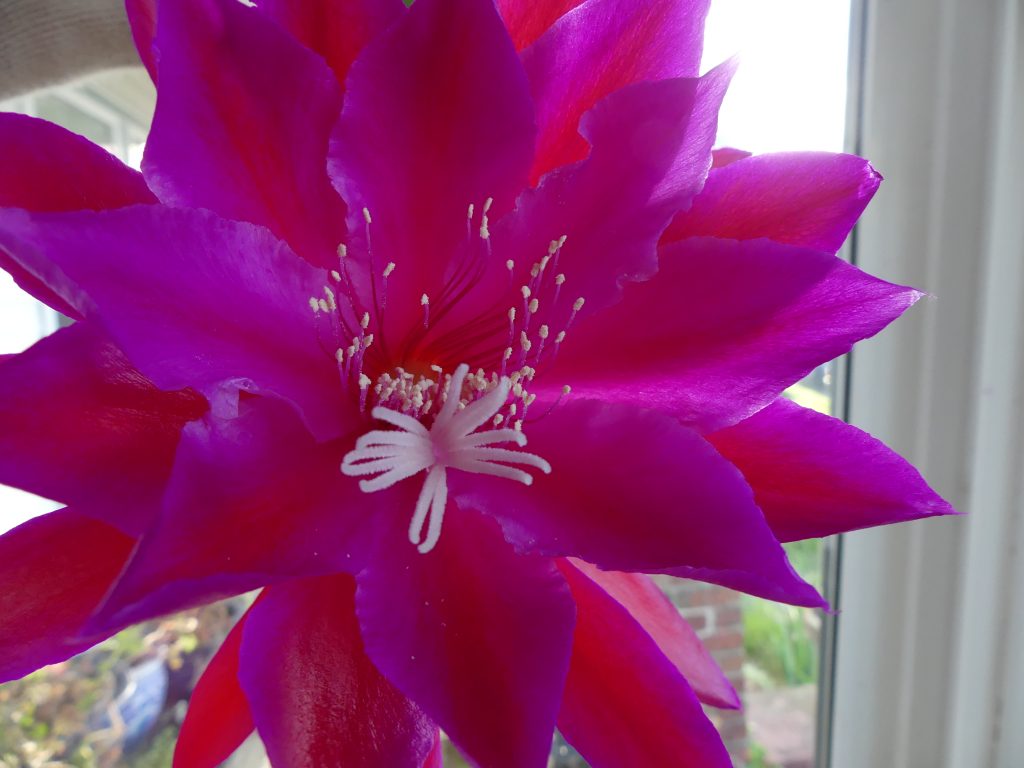
Epipphyllum Unforgettable – 6″ blooms.
When we try, and use a little of our God given creativity, we can all make a difference in surprising ways.
It’s Earth Day this weekend and I have to admit that I’m still on a big learning curve when it comes to taking care of our planet. Sadly, I didn’t grow up believing that planet care and care for the environment is a spiritual practice! I grew up in the “get saved and get raptured” South, which means that we were all about “getting to heaven,” and the Kingdom of God was off the planet not here. While I am still a big believer in heaven, I now know that as followers of Jesus, we are called to live out the Kingdom here and now! And part of that is taking care of this beautiful planet we call home.
This can still be a challenge when you don’t live around people who practice planet care, or when you move from a place where people really care about the environment, like in California and the Northwest, to a place that is still figuring out recycling like here in Nashville. When we lived in California, our recycling bin was twice the size of our garbage/trash bin. The recycling was picked up weekly along with the garbage. Here in the “IT” city of Nashville, recycling is picked up once a month and glass recycling is not done curbside at all. You have to take the glass to a recycling center. And plastic grocery bags, banished in many places on the west coast, are still used on a daily basis at most grocery stores here in the South.
It’s scary and mind boggling, but sadly there is still a bit of an
“us verses them” mentality here in America. In the South, too many people still see care for the planet and celebrations like Earth Day as “Liberal” causes and not celebrations and actions we all can participate in as people of God. I believe we are all called to be caregivers of Creation and we can all start and expand the spiritual practice of caring for creation, wherever we are on the planet! And as followers of Jesus we can be examples of living out love for our planet as well as it’s people.
But how do we start? or How do we start again? How do we expand our understanding?
Maybe you are interested in being more “planet aware,” but it feels overwhelming.
Maybe like me, you sometimes shut down because you cannot fix things, or you don’t know enough, or you are just so busy that planet care and sustainability feels like too much!
Like all spiritual practices, it TAKES PRACTICE to take care of the planet!
I am all about baby steps.
Starting small.
Paying Attention
Being willing to be willing!
Like any good thing, sustainability and planet care take time.
It takes time to recycle.
It takes time to buy food that is less processed and is in less packaging.
It takes time to learn from others who are experts in the field of sustainability and planet care.
We can learn a great deal from our international friends who are paying much more attention to planet care than we are in the States. And those of us in the South can learn a lot from our neighbors on the west coast who have already banned plastic bags and are working towards zero waste. In yesterday’s post, I learned about an organization doing great work against plastic waste AROCHA.
So where do we start?
- Be honest and Pay Attention and take a personal inventory. Like in Recovery/12 Step programs I first have to admit that I have a problem and confess that I need help with this problem. I confess that I am guilty of buying A LOT of stuff in plastic without even paying attention. I admit that I have an obsessive love of zip lock plastic bags! Just this week, I ran into Target to get some laundry detergent (in a large plastic bottle) and we needed eggs, but the “good eggs” were packaged in a 3 layer plastic container! Didn’t really think of this until I put the empty container in the recycling bin! That is an abundance of plastic for one dozen eggs! I will not be buying them like that again! Sadly, I’ve noticed that Costco likes to protect their eggs and fruit in plastic too! Wondering if we could ask Costco to change that? And maybe Target too? If enough voices yell loud enough, often change happens! Again, this involves paying attention, noticing and taking the time to care about little things that add up quickly.
- Start in your neighborhood. What can you do to stick up for the environment and for the health of your community? Can you pick up trash? Can you plant flowers? Can you fight for better recycling? Can you fight the developers who want to over build? Taking time to get to know your neighbors is the first place to start! and then getting to know your local leaders so you can take action together! My next step is to remind my neighbors that they can ask for more recycling bins! We are allowed 3 large bins but most people only have one, which fills up quickly when recycling only happens once a month!
- Be a Learner! Take some time to check out sites on the internet that can help you learn more about the environment and how to care for it. check out this video for a few simple ideas to try!
- Do ONE THING. Like I’ve said on many things, we have to start small and begin. What is one thing you can do to start making a difference for the planet? What is ONE NEW THING you can do to add to what you are already doing for sustainability and planet care? I learned living in California to take my reusable grocery bags to the store, but I am now going to invest in some re useable vegetable bags to use in the produce aisle. I also started taking a cloth napkin in my purse and in my back pack to use when I am eating on the road so I don’t use so many paper ones. And just recently I bought a new, bigger water bottle to carry with me wherever I go. My old one was too hard to clean so it often got left at home and I resorted to buying plastic water bottles that became trash/recycling.
- PRAY! Pray for our Planet. Pray for people around the globe to want to care for their neighborhoods. Pray for local and national leaders to make good choices for the Environment. Pray for ways you personally can be a better care giver of creation. For me it starts by saying I’m sorry. I’m sorry God, that too often I don’t see the needs around me. Too often I don’t take the time to care for the planet or to stand up for causes that protect the environment. Give me your eyes to see the beauty of this planet. Give me your hands to make a difference and help me to take responsibility for how I live here. Forgive me for the ways I have failed. Help me love creation as much as you do! AMEN
Give yourself permission to be on a learning curve. Give yourself grace as you learn to practice sustainability. Jesus wants us to love others and love the planet, one step at a time. What’s your first baby step? I’d love to hear about it!
One way of thinking about sustainability can be found in the Biblical book of John Chapter 10, verse 10. Jesus proclaims that He came to give abundant life. Often when we reflect on sustainability we emphasize restraint, reducing and perhaps a sense of loss. Genesis 1 gives us a picture of the ocean as a place of teeming, abundance, diversity and fruitfulness. Pictures of God’s goodness throughout Scripture focus on His lavishness which we sing of in that simple chorus “How wide and deep and long and high is the love of God.” God’s vision for the sustainable life then is not so much John the Baptist in the desert, but the heavenly banquet prepared for us.
We are subverting that vision of the abundant life through our own creation – plastic. That natural fruitfulness and ecological cycles are interrupted by plastic which does not break down or get naturally recycled as does the rest of God’s creation. We think we need more time so we buy “disposable” plastic plates, which in fact never go away! We think we can save money and buy something plastic which we can then throw away rather than something that will last.
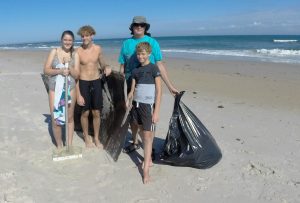
DCIM101GOPRO
All of this “saving” of time and money ultimately costs us – often time and money, but also our health, mental and physical, and the health of our planet. For plastic does not go away. The deepest ocean depths are littered with our plastic. Clean up the big bits of plastic and there will still be loads of microplastics. Plastic breaks down into smaller and smaller pieces called microplastics, pieces of plastic less than 5 mm (3/16 inch) in size. A Rocha has developed a toolbox to help you learn about microplastics and take action. I encourage you to check it out, particularly our Bible study. What does the Bible say about plastic? You might be surprised at what you discover in this inductive study.
The science of microplastics is still in its infancy. However, it is becoming clear that these small pieces of plastic are getting into food webs. Krill in Antarctica, which are a small crustacean which whales thrive on eating, are digesting microplastics. The problem is that they are only becoming nanoplastics! Birds appear to have a particularly affinity for the small of plastic that has been in the ocean and many individuals have been found their stomach full only of plastic. We don’t know yet what this means for human health and well-being. These small plastics appear to be like sponges for toxins. Are these toxins bio-accumulating up the food chain, similarly to toxins such as mercury? Scientists are working on this question, but if ever there was a need for prudence it is likely here in our appetite for plastic products.
So do read through blogs and check websites on how to reduce your plastic use – some good ones include the one you are reading and also those by Ruth Valerio. There is a Plastic-Less Living FB site and many websites to help you live more sustainably in regards to plastic pollution, for example the Beat the Microbead site. In A Rocha’s Microplastics Toolbox there is a Media section which will direct you to some of the better ones.
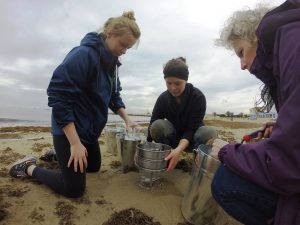
DCIM100GOPRO
A Rocha International, the Anglican Communion Environment Network and other partners are beginning to mobilise the global church to take part in next year’s coastal cleanup on Sept 15, 2018. A beach cleanup guide is available to help those who want to organise their own events (also in Spanish). We also encourage churches to find a beach cleanup near them using the International Coastal Cleanup website and join their neighbours in this God-honouring and community-serving activity. If you are not near the coast – a lake or river will do just as well! It is a practical way to not just reduce your plastic use, but contribute to the beautifying of God’s world. It is also a lot of fun! Consider adding it to your church’s mission trips as this church did on its trip to the Bahamas. Make sure you let us know so we can track and report on the global Church’s involvement in this important and missional activity.
Most importantly, though, determine in your heart that God’s plan for the planet and for you is goodness and abundant life through Christ. Reflect on how you are subverting that plan through how you use plastic. Sustainability will lead to an abundant life for all – people, places and all the life they hold.
 Dr Robert D Sluka leads A Rocha’s Marine and Coastal Conservation Programme (www.arocha.org/marine). He is a curious explorer, applying hopeful, optimistic and holistic solutions to all that is ailing our oceans and the communities that rely on them. Dabbling in theology, he writes on the interface between Christian faith and marine conservation. He has worked cross-culturally, living for extended periods in Australia, India, Great Britain and his native USA where he currently resides. Robert’s research focuses on marine biodiversity conservation, plastic pollution, and fisheries, particularly marine protected areas. The ultimate goal is to glorify God through oceans and communities being transformed using holistic marine conservation. @BobSluka on Twitter or bob.sluka@arocha.org
Dr Robert D Sluka leads A Rocha’s Marine and Coastal Conservation Programme (www.arocha.org/marine). He is a curious explorer, applying hopeful, optimistic and holistic solutions to all that is ailing our oceans and the communities that rely on them. Dabbling in theology, he writes on the interface between Christian faith and marine conservation. He has worked cross-culturally, living for extended periods in Australia, India, Great Britain and his native USA where he currently resides. Robert’s research focuses on marine biodiversity conservation, plastic pollution, and fisheries, particularly marine protected areas. The ultimate goal is to glorify God through oceans and communities being transformed using holistic marine conservation. @BobSluka on Twitter or bob.sluka@arocha.org
By Britni D’Eliso —
I have 36 slaves working for me.*
In order to provide the clothing, food, technology and hygiene products that I currently own and use daily, 36 people have suffered through inhumane working conditions to create products that meet my needs, in effort to potentially earn a small pittance to feed and care for their families.
For the past eight years, I have intentionally educated myself about unfair labor practices and the role that the average American plays in perpetuating the atrocity of slave labor. Despite investing time, energy and effort into gathering this information and working to adjust my lifestyle, I still have 36 people sacrificing their quality of life so that I can improve mine. And that’s 36 too many.
There is a travesty of social injustice happening, across the world and in our own closets. “On 24 April 2013, the Rana Plaza building in Bangladesh collapsed. 1,138 people died and another 2,500 were injured, making it the fourth largest industrial disaster in history…There were five garment factories in Rana Plaza all manufacturing clothing for big global brands. The victims were mostly young women.” ** And this is certainly not how Jesus intended his children to treat each other. We are here to demonstrate compassion, kindness, humility, gentleness and patience to one another, out of obedience and honor to our Savior who established the ultimate example of loving others. And we are specifically instructed to extend this grace to “the least of these,” which undoubtedly includes the young women and children working in egregious conditions in effort to survive.
Consider the instruction Paul provides in Colossians chapter 3:
“…since you have taken off your old self with its practices and have put on the new self, which is being renewed in knowledge in the image of its Creator. Here there is no Gentile or Jew, circumcised or uncircumcised, barbarian, Scythian, slave or free, but Christ is all, and is in all.
Therefore, as God’s chosen people, holy and dearly loved, clothe yourselves with compassion, kindness, humility, gentleness and patience. Bear with each other and forgive one another if any of you has a grievance against someone. Forgive as the Lord forgave you. And over all these virtues put on love, which binds them all together in perfect unity.
Let the peace of Christ rule in your hearts, since as members of one body you were called to peace. And be thankful. Let the message of Christ dwell among you richly as you teach and admonish one another with all wisdom through psalms, hymns, and songs from the Spirit, singing to God with gratitude in your hearts. And whatever you do, whether in word or deed, do it all in the name of the Lord Jesus, giving thanks to God the Father through him.”
[Colossians 3:9-17]
Christ is all, and is in all. Christ is in me, is in you, and is in the resilient and beautiful woman spending hours a day in Cambodia, literally slaving away to create clothing that you or I will purchase months later with the bulk of the profit going to the middle-man company or into our own pockets in the form of “getting a great deal.” What a contrast to consider clothing ourselves in forgiveness, love and unity, rather than clothing marked by injustice and inequality. And in this way we allow peace to reign, with human value and worth being restored and Christ’s body being made whole again.
Akin to the topics of racism, animal cruelty and other social justice issues, feeling shame and regret does nothing to instigate change or promote justice. So these words are not meant to be condemning or to invoke shame that just further stifles action. We are now informed and thus equipped to make different choices. We most definitely have the ability to determine how we choose to purchase materials throughout our day to day lives. And even more, we have the freedom to adjust our supposed level of “need,” to pursue simple, minimalist lives that can have less negative impact on the lives of our brothers and sisters in other parts of the world.
So what are the first steps? Throughout my years of exploring this topic, I have found some effective strategies that have been sustainable for my family and have proven to moderate our use of slave-labor purchases:
-Consume less. Practice minimalist strategies and evaluate needs vs. wants
-Shop second-hand. Many household items and clothing can be thrifted and are perfectly functional, found at a local thrift store or online at websites such as www.thredup.com. Even if these items were originally made with slave-labor, buying them second-hand reduces the “demand” that keeps this industry going, and is more feasible for the average American family to afford.
-Gather friends for a clothing swap. Collect clothing you may not be ready to drop off at an unknown donation site, but wouldn’t mind seeing on a friend. Plan an evening with snacks, pool your clothing and swap away!
-Make your own (or ask your mom to make it for you)
-Save up for high quality purchases that will cost more upfront but will last longer and will truly help support a local or long distance artisan. Oliberte and Pact are two of my favorite fair-trade companies that often have sales.
-Say no to the “good deal” at your local department store. Recognize that your savings likely come at the cost of a brother or sister somewhere else in the world, and it’s just not worth it.
-Educate yourself:
https://www.fashionrevolution.org/about/get-involved/
Find out how many slaves are working for you: http://slaveryfootprint.org
**https://www.fashionrevolution.org/about/why-do-we-need-a-fashion-revolution/
As an Amazon Associate, I receive a small amount for purchases made through appropriate links.
Thank you for supporting Godspace in this way.
When referencing or quoting Godspace Light, please be sure to include the Author (Christine Sine unless otherwise noted), the Title of the article or resource, the Source link where appropriate, and ©Godspacelight.com. Thank you!

